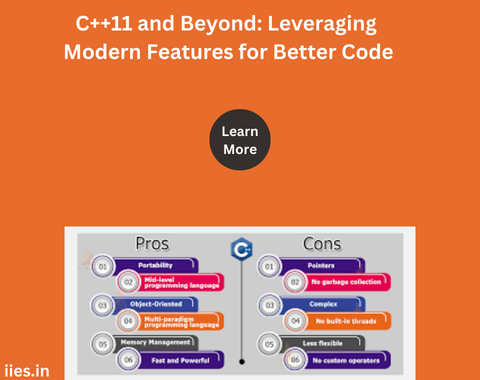Before diving into the modern features, it is essential to understand the context in which C++11 emerged. C++98 and C++03, the predecessors of C++11, were robust but came with limitations. The need for manual memory management, the absence of a standard threading library, and the lack of features like lambda expressions and smart pointers made the language less accessible to new developers and prone to errors in complex projects.
C++11 was designed to address these issues by introducing features that simplify coding, enhance performance, and improve safety. This release marked a paradigm shift in C++ programming, making it more modern and competitive with other languages that were gaining popularity, such as Java and C#.
Enhancing Safety and Efficiency with Smart Pointers
One of the most significant additions in C++11 is the introduction of smart pointers. In traditional C++, developers had to manage memory manually using raw pointers, leading to issues like memory leaks, dangling pointers, and undefined behavior. Smart pointers—specifically std::unique_ptr, std::shared_ptr, and std::weak_ptr—automate memory management, ensuring that resources are properly released when they are no longer needed.
-
std::unique_ptr: This smart pointer ensures that a resource has only one owner at any given time. When the owner pointer is destroyed or reassigned, the resource is automatically deallocated, preventing memory leaks.
-
std::shared_ptr: Unlike std::unique_ptr, std::shared_ptr allows multiple pointers to own the same resource. It uses reference counting to keep track of how many pointers share ownership. When the last shared_ptr is destroyed or reset, the resource is deallocated.
-
std::weak_ptr: This smart pointer is used in conjunction with std::shared_ptr to prevent circular references, which can cause memory leaks. A std::weak_ptr does not affect the reference count and does not own the resource. It can be converted to a std::shared_ptr when needed.
These smart pointers not only reduce the likelihood of memory-related bugs but also make the code more readable by clearly expressing ownership semantics.
Lambda Expressions: Simplifying Functional Programming
Another transformative feature introduced in C++11 is lambda expressions. Before C++11, developers often had to define functors or use cumbersome function pointers to pass small, unnamed functions as arguments to algorithms like std::for_each or std::transform. Lambda expressions streamline this process, allowing developers to define anonymous functions directly in the context where they are needed.
Lambda expressions improve code clarity and reduce the need for boilerplate code. They enable more functional programming techniques, making C++ more expressive and aligning it with modern programming paradigms.
Move Semantics and Rvalue References: Optimizing Performance
C++11 introduced move semantics and rvalue references, which represent a fundamental change in how objects are handled. Traditionally, copying objects could be expensive, especially for objects with large amounts of data or complex resources. Move semantics allow the resources of temporary objects (rvalues) to be “moved” rather than copied, significantly improving performance.
-
Move Constructors and Move Assignment Operators: These special member functions are used to transfer resources from one object to another, avoiding the need for deep copies.
-
Rvalue References: Denoted by &&, rvalue references enable the identification of temporary objects that can be safely moved. This allows developers to write more efficient code by reusing resources rather than duplicating them.
By leveraging move semantics, developers can create classes and libraries that are both performant and resource-efficient, making C++11 and beyond well-suited for high-performance applications.
Concurrency and Multithreading: A Standard Approach
Prior to C++11, there was no standard way to handle multithreading in C++. Developers had to rely on platform-specific APIs like POSIX threads (pthreads) on Unix-like systems or the Windows API, leading to code that was difficult to port and maintain. C++11 introduced a standardized threading library, making it easier to write portable, multithreaded applications.
-
std::thread: This class represents a single thread of execution. It allows developers to create and manage threads with ease.
-
std::mutex and std::lock_guard: These classes provide mechanisms for protecting shared resources from concurrent access, preventing race conditions.
-
std::async and std::future: These features support asynchronous programming by allowing functions to run concurrently and return results at a later time.
The standardization of concurrency primitives in C++11 and beyond has made it easier for developers to write safe, efficient, and portable multithreaded code, which is increasingly important in modern applications.
The Evolution Continues: C++14, C++17, and Beyond
The introduction of C++11 was just the beginning. Subsequent versions of the language—C++14, C++17, and C++20—have continued to build on the foundation laid by C++11, introducing new features and improvements that further enhance the language.
-
C++14: This version brought small but significant improvements, such as generalized lambda captures, which allow lambdas to capture variables by move, and the std::make_unique function, which simplifies the creation of std::unique_ptr instances.
-
C++17: C++17 introduced features like structured bindings, which allow for more concise and readable code when unpacking tuples, and std::optional, which provides a standardized way to represent optional values. Additionally, the if constexpr statement enables compile-time branching, making template metaprogramming more straightforward.
-
C++20: C++20 is often considered one of the most significant updates since C++11. It introduced concepts, which provide a way to specify constraints on template parameters, making templates easier to understand and use. C++20 also introduced coroutines, which simplify asynchronous programming, and the ranges library, which offers a more powerful and flexible way to work with sequences of data.

